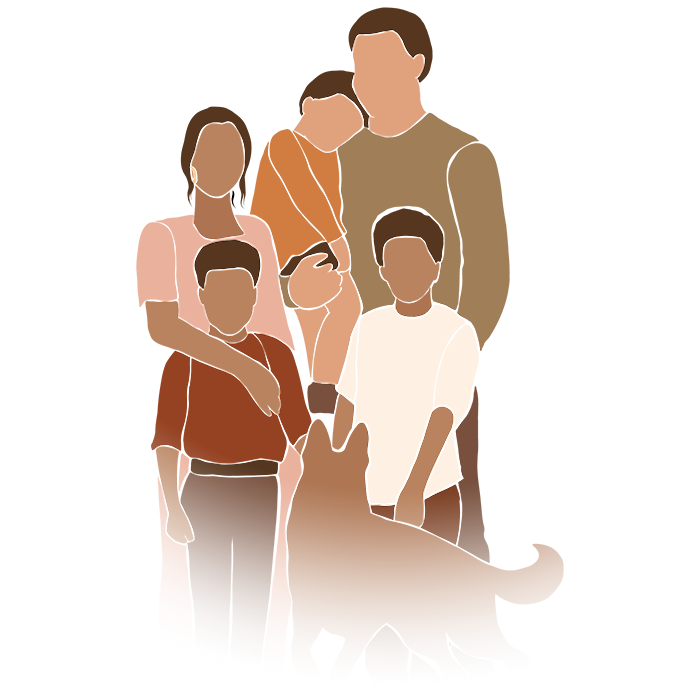Family Counseling in Austin

Nurturing Stronger Bonds, One Session at a Time
AFC is passionate about providing families with the best therapy services available. In order to provide high quality services, we have cultivated a family therapy process that considers the individual members of each family as well as the family as a whole.
To begin family therapy, each member of your family will attend an individual therapy session with the family therapist. This creates an opportunity for each member to share their perspective.
Is Family Conflict Tearing Apart The People You Love?
- Do you constantly fight, argue, and bicker with your co-parent regarding the proper way to raise your children?
- Is a child’s difficult behavior creating chaos for everyone in your household?
- Do you feel forced to choose between being a friend or authority figure to your teenage children?
- Has a recent divorce made it difficult to create a co-parenting plan with your ex?
- Do you long for a peaceful, harmonious household in which everyone gets along, but fear your situation is beyond repair?
 Constant fighting and bickering in your family can make it seem as though offering your children a stable, nurturing environment is out of reach. Perhaps you struggle to maintain peace in your household, especially if you find that you’re devoting a lot of time and energy to managing difficult and obstinate behaviors from your child. Your son or daughter might often have violent, out-of-control tantrums that receive disapproving glances in public or judgment from friends and other parents. Your child may have even needed to change schools because he or she was expelled as the result of physically aggressive behavior.
Constant fighting and bickering in your family can make it seem as though offering your children a stable, nurturing environment is out of reach. Perhaps you struggle to maintain peace in your household, especially if you find that you’re devoting a lot of time and energy to managing difficult and obstinate behaviors from your child. Your son or daughter might often have violent, out-of-control tantrums that receive disapproving glances in public or judgment from friends and other parents. Your child may have even needed to change schools because he or she was expelled as the result of physically aggressive behavior.
Distressing experiences like these aren’t just limited to parents with young children. A rebellious teenager can also lead you to feel as though you’ve lost control as a parent. Perhaps you have noticed moody, melancholic or angry behavior from your teen that has caused you to become concerned. Your teen might seem isolated, unmotivated and withdrawn or spend hours alone playing video games or on social media. You may have even started to wonder whether he or she has an unhealthy attachment to technology. You may worry that, your teen is experimenting with drugs, alcohol, vandalism, shoplifting or sex. As if that weren’t enough, you and your co-parent may struggle tosee eye-to-eye when it comes to raising your children. If you and your co-parent are divorced, communication regarding your children may be particularly contentious.
When dealing with stressful family issues, it’s not uncommon to feel powerless, helpless, angry, hurt, and emotionally drained. You may worry about the impact family conflict is having on your future relationships and desperately hope to restore peace and harmony in your household.
Many Families Experience Conflict
If you’re feeling helpless to resolve your family’s issues and overwhelmed, you are not alone. Almost all families experience conflict as they negotiate the rocky terrain of living and loving together. While having some conflict within your family is to be expected, there are times when it can be extremely helpful to draw from third party guidance and support in a safe space. If your children are acting out because of a recent event (death, illness, or divorce), engaging in unhealthy behaviors (risk-taking,being physically or verbally abusive), or you and your co-parent are strugglingto have effective conversations about your children, you may need to seek the guidance of a family counselor. Thankfully, with an Austin Family Counseling therapist serving as your coach, mediator, and guide, you can face these challenges in a well-informed supportive relationship.
Family Counseling Can Provide A Safe Space For Healing
Counseling can be a very effective means for repairing family wounds, especially if you’re motivated and are committed to attending regular sessions and practicing the tools at home. Setting aside a time and space in which family members can slow down, express themselves, and listen to each other with empathy and compassion can be extremely therapeutic. By having a family dialog in a calm and controlled environment, you can begin to honor each other’s emotions, perspectives, and experiences without reacting from a place of fear, disappointment, or resentment. Moreover, your family therapist can help you attend to your children’s emotional needs and empower them to focus on emotional health in the face of family conflict. As a professional specially trained in the art and science of family counseling, your therapist can help you harness your existing strengths as a parent while also teaching you new parenting tools and strategies, including setting appropriate boundaries with your children, coming up with a parenting plan with your co-parent, and using approaches based in Positive Discipline. As you begin to practice your new skills at home, you’ll be able to reflect on your family’s unique successes and challenges with your therapist, who can help you further fine-tune your approach.
Family counseling can also help you mend your relationship with your co-parent, whether you live separately or in the same home. During sessions, you and your co-parent can learn to communicate in healthy ways your concerns about your children. More importantly, you’ll be able to develop a concrete parenting plan that honors both of your goals and values as parents and be able to practice implementing a family plan with your children in order to get everyone on the same page and find collaborative solutions.
 Last but not least, your children will have the opportunity to voice their worries, fears, and frustrations as they open up to a trusted, nonjudgmental, compassionate ally. By using approaches like art, play, and talk therapy, children and teenagers can express painful emotions, thoughts, and experiences in a language with which they can relate and understand. They can also learn powerful, long-term communication skills and discover ways to regulate strong emotions like anger, sadness, and anxiety. To learn more about sessions for children and teens, please visit our child counseling and teen counseling pages.
Last but not least, your children will have the opportunity to voice their worries, fears, and frustrations as they open up to a trusted, nonjudgmental, compassionate ally. By using approaches like art, play, and talk therapy, children and teenagers can express painful emotions, thoughts, and experiences in a language with which they can relate and understand. They can also learn powerful, long-term communication skills and discover ways to regulate strong emotions like anger, sadness, and anxiety. To learn more about sessions for children and teens, please visit our child counseling and teen counseling pages.
Whether you’re struggling to manage family conflict, a child’s challenging behavior , or are having trouble communicating with your co-parent, family counseling can help you break free from negative patterns occurring in your household. We all have challenges when it comes to raising a family. By uniting together on the path toward healing, you’ll be sending the world a powerful message about the strength and resilience of your family.
Perhaps Family Counseling Seems Like The Right Choice, But You Still Have Some Questions and Concerns…
I’m worried the therapist will think I’m a bad parent.
You’re not a bad parent! You wouldn’t bother researching family counseling if you were. During therapy you’ll have an opportunity to recognize your strengths as a parent, while also learning new approaches and parenting skills.
Family counseling is too expensive.
Family counseling is an investment in your family’s wellbeing. You wouldn’t put off treating a broken bone because of the cost, so why should wounds to your mental health be treated any differently? By prioritizing health and wellness for your family you may also avoid costly lessons and crises.
I’m afraid people will judge us if they find out we’re seeing a family therapist.
Austin Family Counseling offers a safe, nonjudgmental, and confidential environment for the whole family.
You Can Have The Family Existence You Always Dreamed Of
With the help of family counseling, it’s possible to treat each other with greater empathy, compassion, and respect. We will be happy to help schedule an appointment or answer any questions you might have. In the meantime, check out our blog where we regularly highlight important family-related topics.








